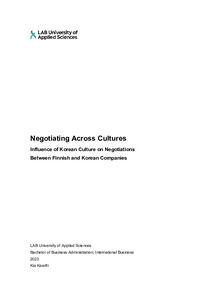Negotiating Across Cultures : influence of Korean culture on negotiations between Finnish and Korean companies
Kaartti, Kia (2023)
Kaartti, Kia
2023
All rights reserved. This publication is copyrighted. You may download, display and print it for Your own personal use. Commercial use is prohibited.
Julkaisun pysyvä osoite on
https://urn.fi/URN:NBN:fi:amk-2023112431566
https://urn.fi/URN:NBN:fi:amk-2023112431566
Tiivistelmä
In the global business environment, it is an advantage to understand how culture affects people’s behaviour in negotiations and other business interactions. Based on this idea, the thesis studied how Korean culture affects negotiations conducted between Finnish and Korean companies. The purpose of the thesis was to facilitate negotiations between the two cultures by offering Finnish businesspeople insight on what kind of cultural traits should be considered when negotiating with Korean businesses.
The thesis was based on two theories concentrating on culture, the Cultural Prototypes Theory and the Cultural Types Model. To connect culture to negotiations, a framework for negotiation research was utilized, with the focus being on negotiation strategy, cultural ideas of trust and problem-solving mindsets. Additional secondary data was gathered on the national cultures of Korea and Finland.
Qualitative primary data was collected by interviewing six Finnish professionals with experience negotiating with Korean businesspeople. Data from the semi-structured interviews was examined through thematic analysis.
The study results show that from the viewpoint of Finnish negotiators, there are five major characteristics of Korean culture that affect negotiations. These characteristics include the relationship focused style of conducting business, direct manner of communication, tendency to preserve face in front of others, preference for quick action and strong hierarchy. The results of the study can be utilized by Finnish companies when preparing to conduct business with Korean businesses. Further study is needed to examine especially how cultural similarities and differences as well as their effects on negotiations between the two cultures are perceived by Korean professionals.
The thesis was based on two theories concentrating on culture, the Cultural Prototypes Theory and the Cultural Types Model. To connect culture to negotiations, a framework for negotiation research was utilized, with the focus being on negotiation strategy, cultural ideas of trust and problem-solving mindsets. Additional secondary data was gathered on the national cultures of Korea and Finland.
Qualitative primary data was collected by interviewing six Finnish professionals with experience negotiating with Korean businesspeople. Data from the semi-structured interviews was examined through thematic analysis.
The study results show that from the viewpoint of Finnish negotiators, there are five major characteristics of Korean culture that affect negotiations. These characteristics include the relationship focused style of conducting business, direct manner of communication, tendency to preserve face in front of others, preference for quick action and strong hierarchy. The results of the study can be utilized by Finnish companies when preparing to conduct business with Korean businesses. Further study is needed to examine especially how cultural similarities and differences as well as their effects on negotiations between the two cultures are perceived by Korean professionals.
